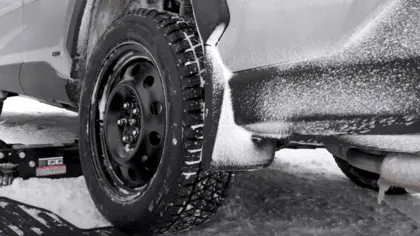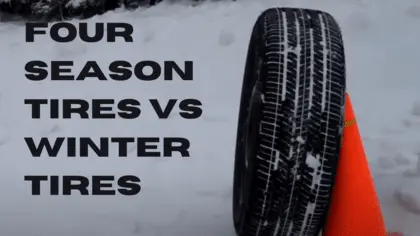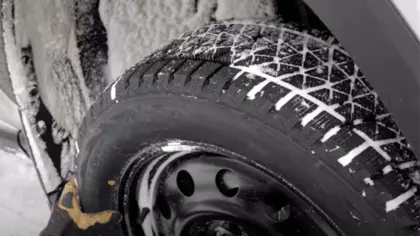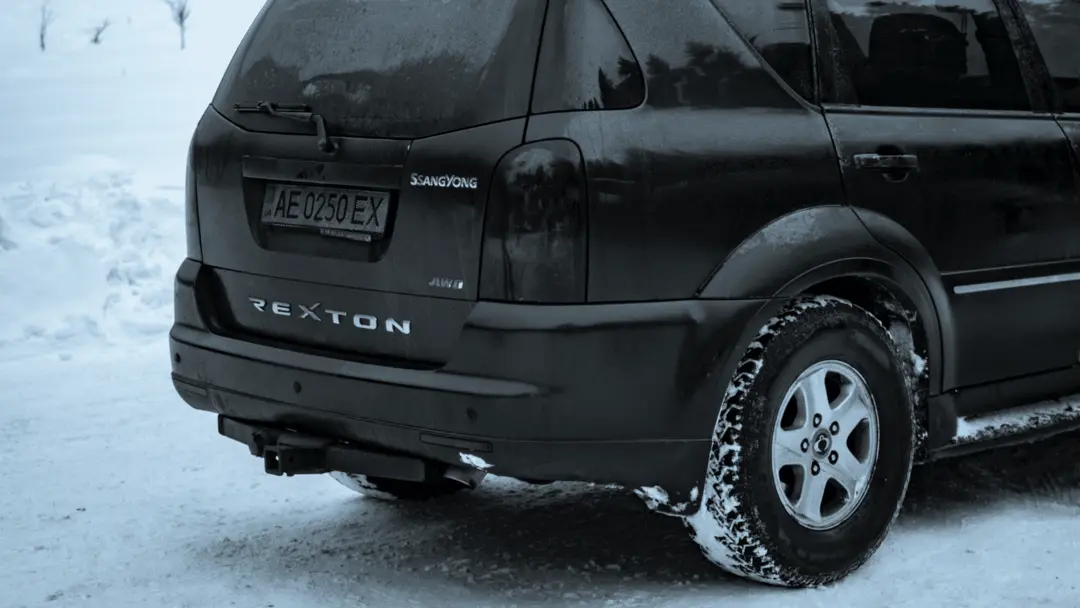A lot of people have a common question about the differences between winter and 4 seasonal tires. Don’t worry! If you’re looking to buy winter tires, we’re here with information on winter tires and season tires to help you decide which is better for your needs this year.
4 season touring tires are designed for people who want to use them mostly on highways and secondary streets. While winter tires are created for use in low temperatures.
In this article, you will go through the ultimate comparison of season tires and winter tires. So, let’s look in depth at “ 4 Season tires vs Winter tires.”
Contents
What are 4 season tires and winter?
Winter tires are mainly built to transport in snow and wet conditions. They also have soft rubber that retains its flexibility in colder temperatures. This softness can be a problem in high temperatures, and it is necessary to change winter tires when spring arrives.
4 season tires are built to work in a variety of conditions, including wet roads and light winter driving, and they offer flexible efficiency. They are made to bring together the benefits of summer and winter tires.
What’s the difference between 4 season and winter tires?

Design
4 Season tires are made for dry and snowy conditions. They are sized with medium tread blocks that have greater edges than the summer tire. Hair-thin cuts increase grip. In colder temperatures, they’ll get harder, reducing their grip and traction.
Winter tires are rubber compounds created to offer additional grip at low temperatures. They are designed with a tread that can crush snow. They are perfect for areas where winter storms are common and snowstorms.
Safety
In the winter months, a vehicle with snow tires will be 38 percent less likely to get involved in a crash than a car with all-season tires.
Performance
Winter tires can travel from 60-100mph in 19.1 seconds when it is snowing; however, season tires can achieve this in 22.9 seconds. In the snow, it was possible for snow tires to stop from 60mph in just 382 feet, while season tires required 421 feet.
In wet conditions, winter tires speed up from 0-60 speed in 12.7 seconds, while the season tire was 15.4 seconds. When stopped in wet conditions at 60 mph, it was noted that the snow tires stopped around 181 feet while those with season tires stopped at 215 feet.
In dry conditions, winter tires can accelerate from 0-60 speed at 8.9 seconds, while season tires go through the process in 8.7 seconds. Seasonal tires stop at 130 feet, whereas snow tires stop at 155 feet.
Tread Pattern
Large grooves and firm, chevron-shaped tread blocks are typical characteristics of regular winter tires. Styles of winter tires have high-speed density, which helps in ice and snow grip. The tread sipes give the edge needed to bite but maintain the quality of the tread, resulting in more control and lower noise levels.
Cost
All-season tires, including installation, cost between $60 and $125 per tire plus tax. Winter tires cost between $65 and $120 per tire plus tax. With proper maintenance, they last for six years.
Four Season Tires Vs Winter Tires: Pros & Cons

4 Season tires
Pros:
- Seasonal tires are an affordable option for maintaining your vehicle
- Vary in tire voids, siping, and tread compound hardness
- Ideal for locations with little seasonal change
- Seasonal tires are suitable for all-year use
- Include a broad range of tire types and features
Cons:
- For drivers in the snow belt, it might not be recommended
- Start to sacrifice longevity and performance when challenged in extreme temperatures
Winter tires

Pros:
- Stays flexible even in extremely cold temperatures
- Designed to help you navigate through slush and snow
- Reduce the accumulation of snow
- Give better traction to the snow.
- Helps to draw water off the road
- Make sure you have traction, a comfortable ride, and safety in consideration
Also Read: Are Wider Tires Better For Off-road
Cons:
- Winter tires may end up costing more in the long term.
Comparison of 4 Season Tires Vs Winter Tires
| 4 Season Tires | Winter Tires | |
|---|---|---|
| Identification | Marked with “M+S” | Marked with mountain and snowflake symbol |
| Road conditions | Rain, dry, some light snow ~45ºF and up | Snow, ice, rain, and slush ~45ºF and below |
| Rubber | A rubber compound with greater durability | The less durable rubber compound remains flexible even in cold weather. |
| Performance in snow | 0-60 in 22.9 seconds, stop in 421 feet | 0-60 in 19.1 seconds, stop in 382 feet |
| Performance in rain | 0-60 in 15.4 seconds, stop in 215 feet | 0-60 in 12.7 seconds, stop in 181 feet |
| Performance in dry conditions | 0-60 in 8.7, stop in 1531feet | 0-60 in 8.9, stop in 155 feet |
| Weather | Warm, dry, and wet weather | Harsh winters with plenty of snow |
| Siping | Siping season tires reduce the heat and provide some traction when wet. | Winter tires are typically equipped with more siping in order to increase grip in winter conditions. |
| Tread pattern | It provides grip in warmer temperatures. A more refined tread is not suitable for slush and snow. | The tread is a blocky one with slits of fineness that are able to grip snow and remove slush. |
4 Season tires Vs. Winter tires: Which are best?

The answer for the All- season tires vs. Winter tires debate is contingent on your location and the weather conditions under which you drive.
If you see only the occasional snow falls throughout the year, and icy, slippery roads seem more like a blip rather than a regular occurrence, then season tires are the right choice if you are aware of a time when roads that are icy are commonplace, and winter tires aren’t an excessive precaution.
When installing winter tires to prepare for the winter season, ensure that you have a complete set. Simply changing the front tires can increase the possibility that the rear tires will slide. In the same way, simply placing winter tires on the rear wheels can make the front wheels lose grip and make it difficult to control your vehicle.
Remember to re-mount your winter tires once spring arrives. While winter tires are definitely superior in winter’s harshest weather conditions, these tires wear quicker on dry, warm roads.
Also Read: Difference between 255 and 275 tires
Summary
I hope that you have a clear idea about 4 Season tires vs. winter tires. But let’s go over the basics: Winter Tires are specifically designed for colder weather conditions. They are not as effective in summer temperatures. 4 season tires can be used in all weather conditions but do not excel in particular weather conditions.
What do you think? Wanna take 4 Season tires or Winter tires?
Resources:
- https://generaltire.com/our-world/latest-news/all-season-vs.-winter-tires-the-differences-of-a-cold-climate-tire
- https://advanced-driving.co.uk/driving-blog/all-season-tyres-vs-winter-tyres/
- https://www.tires-easy.com/blog/winter-tires-vs-all-season-tires/
- https://www.cars.com/articles/whats-the-difference-between-summer-winter-and-all-season-tires-439823/
- https://www.bridgestonetire.com/learn/shop/winter-snow-tires-vs-all-season-tires/

Hello, this is Wesley Shelton, currently working in a car restoration company for over 5 years. Before that, I was a worker at a small car repair shop. As I was a car freak from a young age and worked as a professional for over half a decade, I think I now know pretty much everything about every car and its parts. To establish my name as a professional and help others by sharing my knowledge, I’ve created this website, which I work on whenever I get free time. I hope you’ve enjoyed my informative blog!

